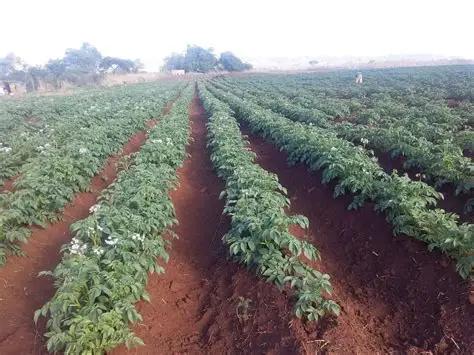News / National
Zimbabwe pushes for import substitution
10 Aug 2025 at 22:39hrs | Views

Zimbabwe has planted 5,000 hectares of Irish potatoes this winter season as part of an ambitious government-led drive to cut reliance on imports and boost local food security. The target is to reach 9,750 hectares of production by the end of the season.
The initiative, spearheaded by the Ministry of Lands, Agriculture, Fisheries, Water and Rural Development, is central to the country's ongoing efforts to strengthen domestic agricultural output.
Speaking during a field tour of Ruargo Farm in Goromonzi, Permanent Secretary for Agriculture, Professor Obert Jiri, confirmed the progress, emphasizing the strategic importance of potatoes in Zimbabwe's food system.
"Potatoes are a designated strategic crop, and this production drive is part of our broader import substitution strategy. With 5,000 hectares already planted, we are on track to meet our seasonal target," said Prof. Jiri.
To support farmers and accelerate planting, Kutsaga Research Station has introduced a 30% discount on seed potatoes. The move is expected to improve availability and affordability of quality seed, particularly ahead of the festive season when demand typically peaks.
Zimbabwe has officially treated potatoes as a strategic crop since 2010, a status that comes with policy protections including an import ban aimed at shielding local farmers from cheaper foreign produce. Despite this, persistent shortages of seed potatoes have historically forced the country to import up to 60% of its annual seed requirement—approximately 25,000 tonnes.
To address the gap, the Zimbabwe Potato Micro-Propagation Association (ZPMA)—tasked with seed certification and marketing—has expanded production areas significantly since 2019. This expansion is intended to bolster local seed supply and minimize import dependency.
In addition to government and research support, farmers are also entering into off-take agreements with agro-processors. These partnerships ensure both market access and long-term production sustainability, creating a win-win model for growers and industry players alike.
As Zimbabwe intensifies efforts to build a self-sufficient agricultural sector, the success of the potato programme is seen as a key benchmark for other strategic crops under the country's import substitution policy.
The initiative, spearheaded by the Ministry of Lands, Agriculture, Fisheries, Water and Rural Development, is central to the country's ongoing efforts to strengthen domestic agricultural output.
Speaking during a field tour of Ruargo Farm in Goromonzi, Permanent Secretary for Agriculture, Professor Obert Jiri, confirmed the progress, emphasizing the strategic importance of potatoes in Zimbabwe's food system.
"Potatoes are a designated strategic crop, and this production drive is part of our broader import substitution strategy. With 5,000 hectares already planted, we are on track to meet our seasonal target," said Prof. Jiri.
Zimbabwe has officially treated potatoes as a strategic crop since 2010, a status that comes with policy protections including an import ban aimed at shielding local farmers from cheaper foreign produce. Despite this, persistent shortages of seed potatoes have historically forced the country to import up to 60% of its annual seed requirement—approximately 25,000 tonnes.
To address the gap, the Zimbabwe Potato Micro-Propagation Association (ZPMA)—tasked with seed certification and marketing—has expanded production areas significantly since 2019. This expansion is intended to bolster local seed supply and minimize import dependency.
In addition to government and research support, farmers are also entering into off-take agreements with agro-processors. These partnerships ensure both market access and long-term production sustainability, creating a win-win model for growers and industry players alike.
As Zimbabwe intensifies efforts to build a self-sufficient agricultural sector, the success of the potato programme is seen as a key benchmark for other strategic crops under the country's import substitution policy.
Source - online










































